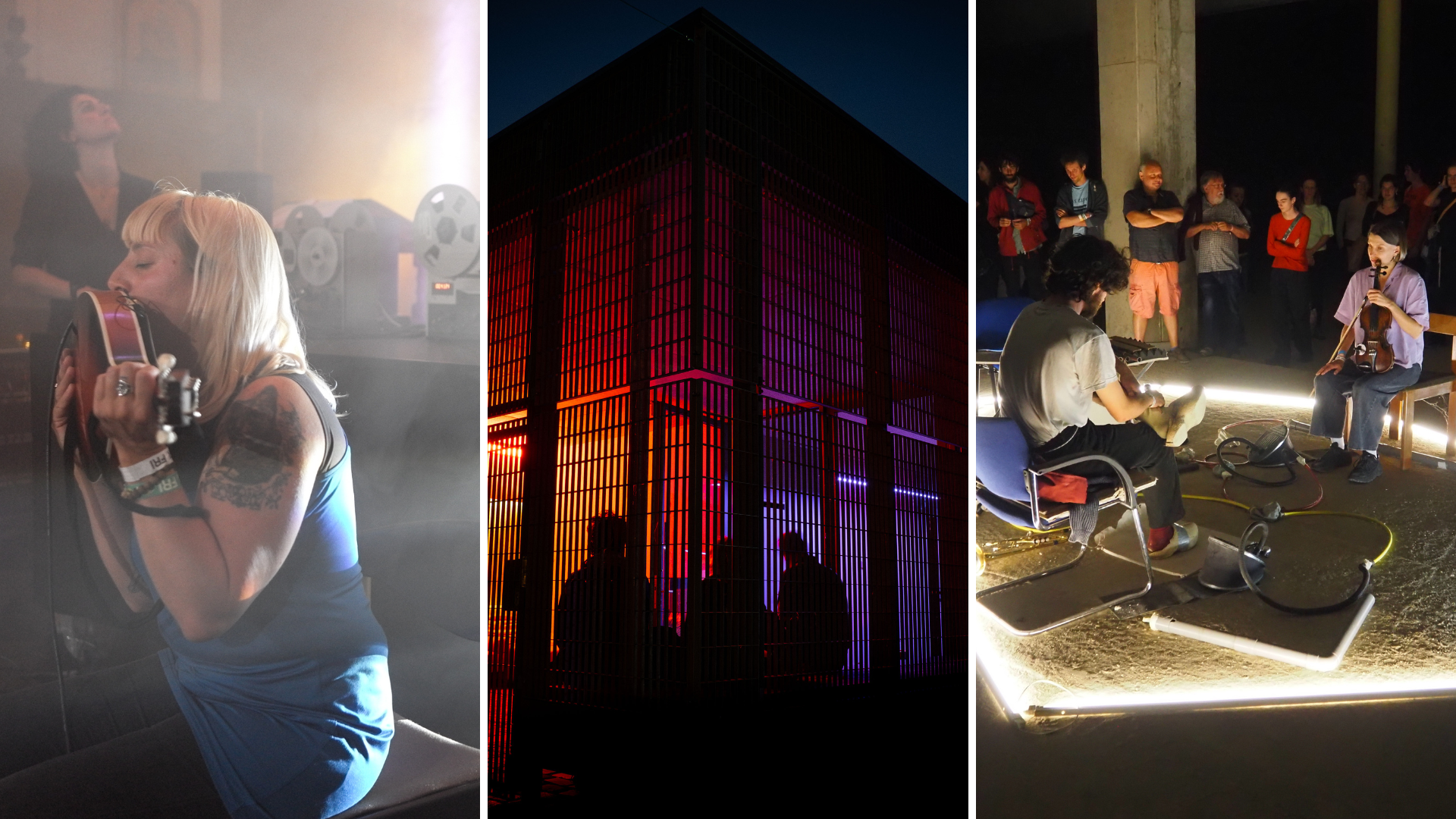Eupen is not a town that features much in the Belgian conversation. In the multilingual debates that have politicians in Flanders, Wallonia and Brussels arguing about the fortunes of each region, this pocket of the country doesn’t register at all. Though the quaint town of 20,000 is the capital of Belgium's German-speaking Community, Eupen's imprint on national affairs is negligible.
Situated at the end of the railway that crosses the length of the country, the terminus was almost empty when we stepped off on the last Friday of August. We had rolled through Brussels, Leuven and Liège, and the bustle of Belgium's big cities was well behind us as our small band of tent-toting merrymakers wandered into this provincial town that none of us knew anything about. Curiosity carried us forward. We were in for something a bit different.
Meakusma was its name: a festival that champions the innovative and esoteric. Under its banner, pioneers of miscellaneous subgenres serve up a cocktail of live shows and DJ sets, the balance tilted towards electronic styles though with a healthy helping of conventional instruments (not necessarily played in a conventional way). "Haven't heard of any of them," was the general verdict as my colleagues inspected the lineup. Hardly surprising; Belgium's burgeoning festival scene has blockbuster headliners and pyrotechnics in the Flemish flatlands but in Eupen, things are decidedly more reserved. It's about breaking boundaries, which means leaving the bells and whistles for elsewhere.
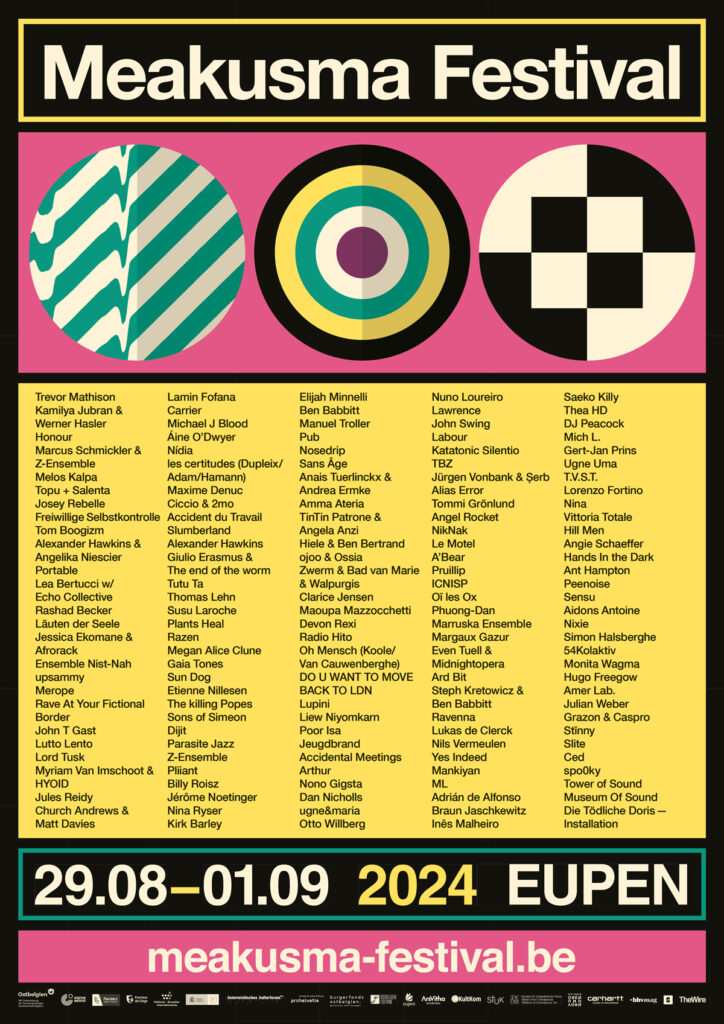
"We shy away from big statements. People can read between the lines. When they look at our lineup, they get the idea." – Meakusma co-founder Michael Kreitz.
We were soon making our way past bars serving up the first apéro of the weekend to locals parked on sunbathed terraces. A distinctly older demographic gave us knowing nods and snippets of German chit-chat made the setting all the more different from the Belgium I have grown used to. On the way we passed beneath the bulbous spires of a of an 18th century church as the clock struck the hour. Ethereal chimes rung in place of bells, a melodic jingle that was part of the "Klangturm" installation that broadcasts a short tune over the city every 15 minutes. It illustrates how the festival softly spreads into the local environs and served as a promising welcome call.
What is a festival?
Meakusma HQ is the Alter Schlachthof – a former slaughterhouse on the edge of town that has been converted into a cultural centre. At first glance it wasn't obvious this was the spot. With a café catering to groups of varying ages, we could just have well been at the entrance to a theatre. It was only a greeting from friends from Berlin that confirmed we were in the right place. Inside, the building was deceptively voluminous, its irregular footprint disguising the numerous rooms that together could accommodate the 1000+ participants.
I found myself marvelling at this architectural feat and wondering how very unlike this was to other music festivals, where the weather has such an influence on the overall procedure. No squelching knee-deep in mud on this occasion. And the building's spacious halls provided a genuine club atmosphere to enjoy the DJ sets. The addition of an art bookstore and vinyl sale only added to the sense that this was not your standard shindig between scaffold podiums.
What is a festival anyway? The concept today brings to mind towering speaker stacks pumping out crowd pleasers to a field full of drunken punters. Whilst there is no set formula and every weekender has its own flavour, the expectations attached to "festival" are hard to shake (you can imagine Roland Barthes unpicking the semiotic associations in a modern Mythologies). The most basic format takes the mindful activity of camping and replaces the serenity of getting back to nature with limitless booze, over-stimulated teens, and popular music played very loud. In small doses the combination can be fun.
Meakusma is a rather different proposition. For starters, it was infinitely more civilised than any other festival I've known. Being in a purpose-designed building didn't only ensure that performances were unhindered by the weather, it came with comforts that one must normally forego. No more degrading yourself in putrid portaloos, here we had clean facilities with proper plumbing instead of sawdust and alcohol gel. And though we were camping, this was in a bucolic meadow next door – an experience made all the better for the excellent shower trailer with hot water aplenty. Yes, the music is all-important. But it's details like this that stop ablutions from becoming distractions.
Concentrating attention purely on the music also means stripping away the extras we've grown used to at other events. Gone are the sponsor flags, the theatre lighting, stage crews, and cameras to capture all the key moments for Instagram. There were no troublemakers and apparently no need to enforce "rules". Added to this, the distance between performers and audience was almost imperceptible. Lord Tusk laughed when he told me how on Friday he struggled through a crowd hyped for his set but who didn't realise it was him trying to get to the stage.
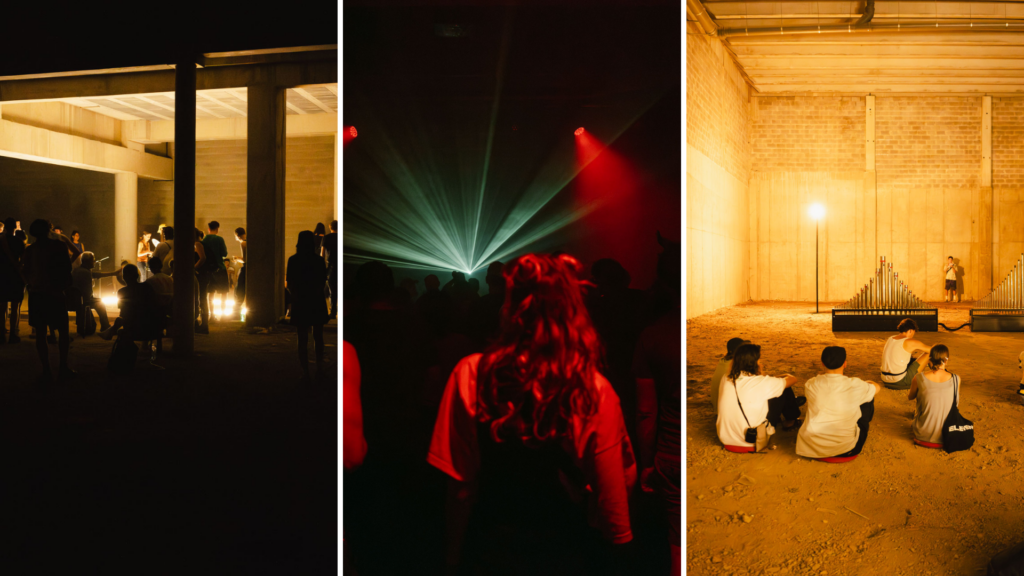
As well as dedicated auditoriums in Alter Schlachthof, the festival makes use of less conventional spaces. Credit: Elias Derboven
This is a journey...
The festival programme was exceptionally diverse. From psychedelic jazz to industrial electronica, krautrock to Afro-Chinese dub, synth doodling to saxophone ensembles, there was a lot going on at any given time. But it isn't just variety that sets Meakusma apart. The arrangement of performances encourages participants to dive into sounds they might not normally gravitate towards. Which one's the main stage? remained an open question. There were six concert spaces on the Alter Schlachthof site, some much larger than others but without a timetable that built up to headline acts.
One of the greatest strengths of the organisation was the juxtaposition of genres that effectively guaranteed you would be exposed to a smorgasbord of sounds. In the words of the organisers: "We strive to give the performers the right context." This means attracting an audience with open ears, something many artists responded to by pushing their live experimentation further than they would in other venues. In the most powerful moments, performers stretched their musicality to the extreme, searching for a resolution among clashing intervals as the listeners absorbed the dissonance. There was an intimacy between performer and observer that cannot be achieved in a show rehearsed to exhaustion.
This vulnerability reached a climax on Sunday evening, when the largest "club" room Halle closed not with a thumping techno set but instead a solo exposition of the Aulos, Greco-Roman double-reeded pipes extinct for over 1,000 years. How many have heard of this ancient instrument, let alone actually heard its sound? The room filled with curious onlookers, most of them sitting, as Belgian artist Lukas De Clerck sat beneath a solitary spotlight and weaved two endless notes around each other.
It was an extraordinary demonstration of circular breathing, the drawl of each telescopic pipe unbroken and phasing in and out of harmony. Some were hypnotised by the overtones; others were put on edge by the discord of the sliding pitches. When the piece ended and the room was illuminated, gaps between the seated audience showed that for some it had been a little too jarring. But those who made it through enjoyed an uncommon instant of musical catharsis, rapt expressions lost for words. Having the courage to programme such a sonically challenging concert at a peak point in the festival is, I'd argue, a resounding triumph in itself.
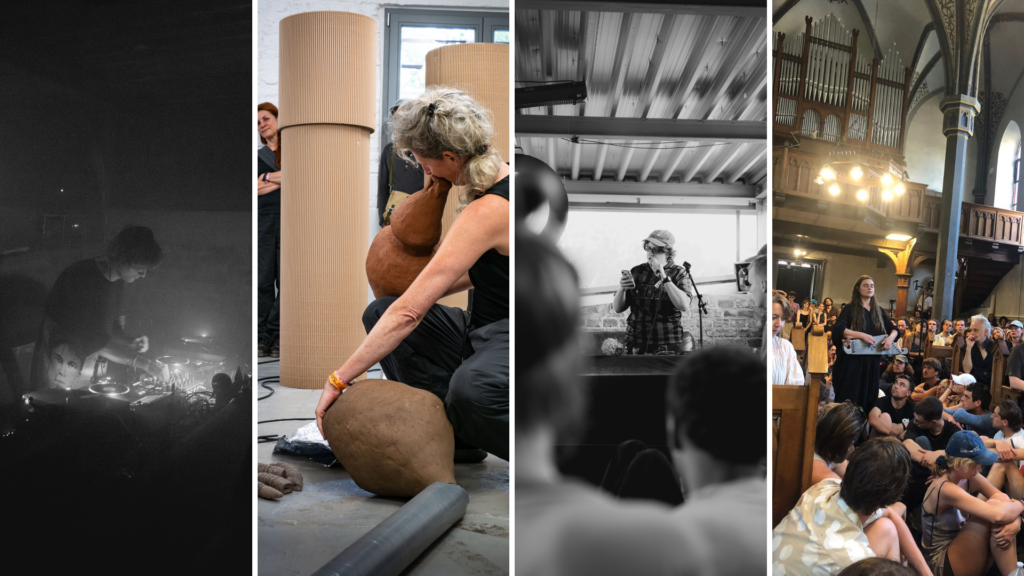
Like nothing you've ever heard before.
And they came from far and wide
Of course, a festival is largely defined by the people there – especially true on a smaller scale such as this. The lineup ensured that there was inevitably a fair amount of nerding out: many of the acts you wouldn't find anywhere else and I spoke to some who only got together for this show. A friend who had been before affectionately recalled an audience of chin-stroking "heads" discussing niche record labels.
But although Meakusma clearly appeals to a serious type (the rare occasions I saw phones on the dance floor was folks checking the record on Discogs), the conversations were never exclusive and all was in a spirit of sharing. With attendees from across the continent and a mix of ages, our musical reference points were scattered, making for some enlightening exchanges as well as other moments where I'd confess I had no clue what they were on about. But unlike other situations where this would be an embarrassing admission of ignorance, here it was never unreasonable.
Some of the more improvised sets left us all baffled and others united us in wonder. One closed with a cover of the post-punk anthem Eisbär – the original edge softened by a female vocal. And though we didn’t all know the German lyrics, everyone chanted the staccato bleeps that this version had cut. It was euphoric.
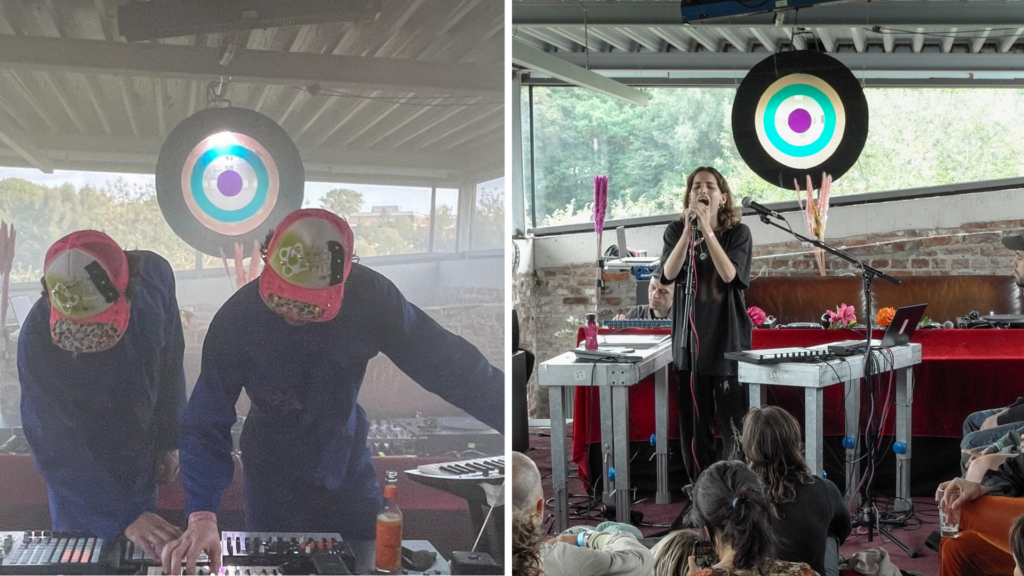
Angel Rocket take flight (left). Inês Malheiro (right).
Though there was no shortage of things to see at the cultural centre, Meakusma encourages participants to explore in all senses. This also meant discovering the town, where several installations and concerts took place over the weekend. An audiowalk guided you through Eupen to landmarks and venues where recordings had been made for specific environments. One of the churches served as a concert hall for Lithuanian group Merope, whose reworked folk songs filled the vaulted nave to the admiration of a full congregation.
Then there was the organ installation by Maxime Denuc and Kris Verdonck, housed in a huge unfinished industrial unit within a disused shopping mall. Three pyramid towers of pipes played a series of MIDI-controlled arrangements from a computer, lit only with three warm bulbs that brightened and dimmed. The effect was mesmerising, as hushed listeners sat on cushions and lost themselves in the celestial soundscape. Many were moved to tears and shuffled from the cavernous room in mute amazement.
A garden party of international renown
There's no denying that we were immensely lucky with the weather – temperatures stayed in the high 20s and sun cream was deployed. Behind the Schlachthof the soundsystem of Brussels 54Kolaktiv provided a dub soundtrack during the day, participants grooving barefoot in front of the wall of birch speaker cabinets. It was a cheerful common ground as cross-dressing ravers hopped around with kids in ear defenders, locals and their dogs took in the scene, and friendships were made when dancers flopped down to chat in the shade. With conditions so fine and the basslines irresistible, this "hinterhof" stage became the beating heart of daytime activity.
This area was all the more appealing for the cluster of food tents and bars next door. Without skipping a beat you could jive over to the wine bar where a jolly trio of father and sons insisted you try their superb selection before making your choice. Other refreshments and baked goodies were to be had from what looked like a large garden shed. It all had a charmingly homespun ambience and with the community vegetable patch as a backdrop it felt like being at a summer garden party. I found myself thinking how my mum would enjoy this. It's not a thought I often have at festivals.
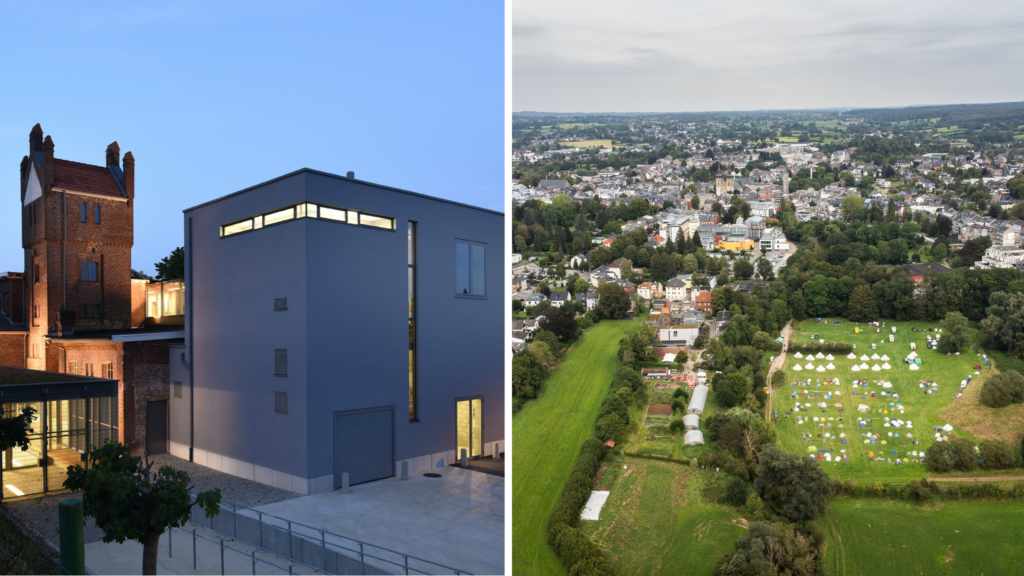
The old slaughterhouse, the beating heart of this year's festival on the edge of Eupen. Credit: Meakusma
The cosy "support your local festival" vibe is largely thanks to the passion that drives the project. Whereas other events aim to turn a profit, Meakusma wants only to be sustainable. "We are artist-focused in everything we do," says co-founder Michael Kreitz, who highlights other branches of the creative ecosystem. As record label since 2008 it has given a platform to cross-genre acts and fostered collaborations that transcend barriers between audience and artist, stylistic backgrounds and nationalities.
With this guiding principle in mind, many have noted that Eupen is a fitting place to celebrate musical and cultural exchange. And although the location is more practical than symbolic (the organisers are from the area), Meakusma is supported by diverse organisations: the East Belgian Community, the regions of both Wallonia and Flanders, the Province of Liège, the Goethe-Institut, the Austrian Cultural Forum, the Spanish Embassy, and the Swiss Arts Council. This unusual breadth of institutions bestows Meakusma with a mark of distinction. And though the organisers insist "It's not up to us to define the festival", there's no question that they've put Eupen firmly on the map.
Some highlights
Devon Rexi: Pulsing rhythms were delivered with distorted bass and percussive punches. The Amsterdam four-piece leapt from lo-fi vamps to driving refrains, turning the packed dance floor into a writhing mass.
Mankiyan: Has a knack for taking an audience into another dimension. We were immersed in a swell of dark beats that grew to a suppressed roar, like holding a lid on a volcano. All hail.
F.S.K: Post-punk for more than 40 years, this iconic German band blended New Wave with folk with literary theory. Rocking a lap steel and regaling us with unlikely stories from before the fall of the Iron Curtain, frontman Thomas Meinecke exuded a story-time-with-grandpa warmth.
Rave At Your Fictional Borders: Could there be a more fitting band for this festival? An energetic jazz jam held together with some pounding drumwork. Heads banged, beers spilled, everybody cheered.
Elijah Minnelli: Dub folk that started pensive and slow. We kicked off our shoes and swayed in unison. Then just as we were getting a bit spaced out he dropped some heavy hitters that shook us into action.
Angel Rocket: As excitement built up to the festival's finale, temperatures were high on Sunday evening. Like one big sweaty family, the audience squeezed into the humid "hayloft", embracing each other and sharing drinks as two lads in blue boiler suits and pink caps improvised over Balearic beats.
Scouts! Guardians of the campsite dishing out revolting fricadelles (IYKYK), ridiculous beer chants, and happy hardcore. They were having their own festival but were hugely obliging for practical assistance.
The Italian trattoria: An excellent end to our Eupen adventure. We killed time before our return train with sumptuous pizzas and pasta. It was a novel way to unwind after a long weekend burning the midnight oil. We reclined on the terrace as plate after plate of rich tomato creations was put in front of us. Then we melted in the midday sun as the limoncello sunk in.
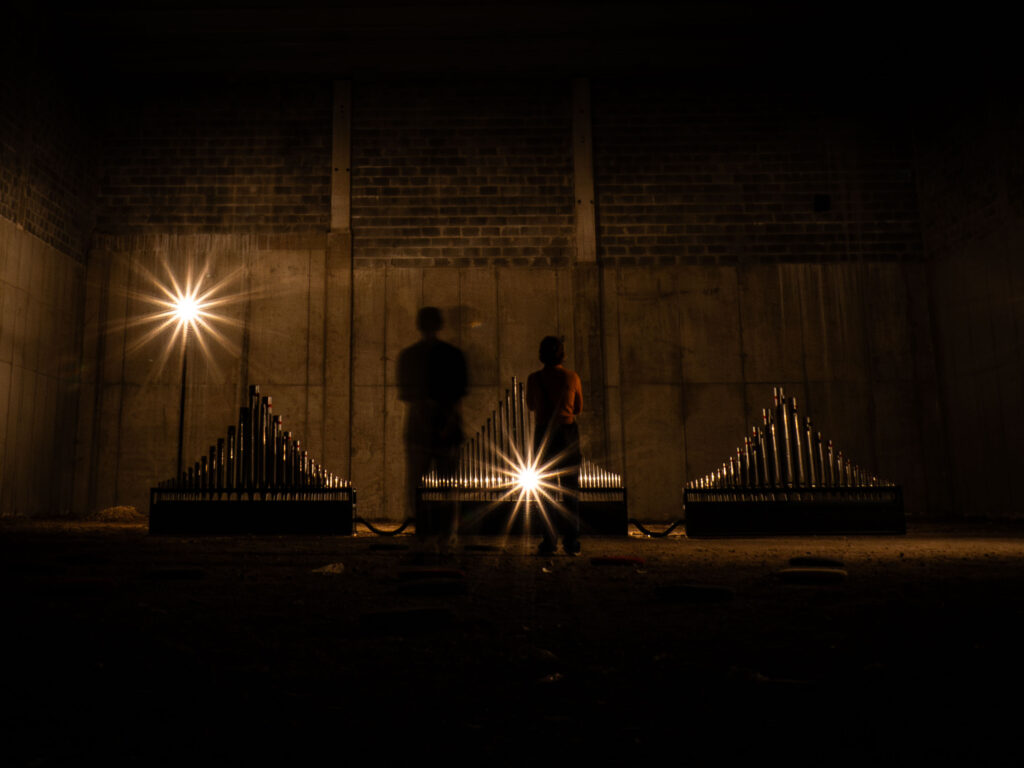
Elevations, an organ installation by Maxime Denuc and Kris Verdonck.

